Why Your HVAC System Deserves a Check-up
An hvac system check is a systematic inspection of your heating, ventilation, and air conditioning components to ensure optimal performance, safety, and efficiency. Here's what you need to know:
Essential HVAC System Check Components:
- Thermostat functionality - Test heating and cooling modes
- Air filter condition - Replace every 1-3 months
- Outdoor unit clearance - Remove debris and ensure 2-foot clearance
- Condensate drain - Clear clogs to prevent water damage
- Electrical connections - Tighten loose connections (professional task)
- Refrigerant levels - Check for leaks (professional task)
- Safety controls - Test all safety mechanisms
About two-thirds of energy in an average home goes to heating and cooling, making your HVAC system's performance crucial for your utility bills.
Neglected HVAC equipment is a primary cause of system failures. Much like a car needs regular oil changes, your HVAC system requires routine checks to prevent breakdowns during extreme weather.
Regular checks catch small problems before they become expensive disasters. A dirty filter increases energy costs, dirty coils force the system to work harder, and a clogged condensate drain can cause water damage and mold.
Many basic checks take just minutes and can save you hundreds, while others require professional expertise for safety and accuracy.
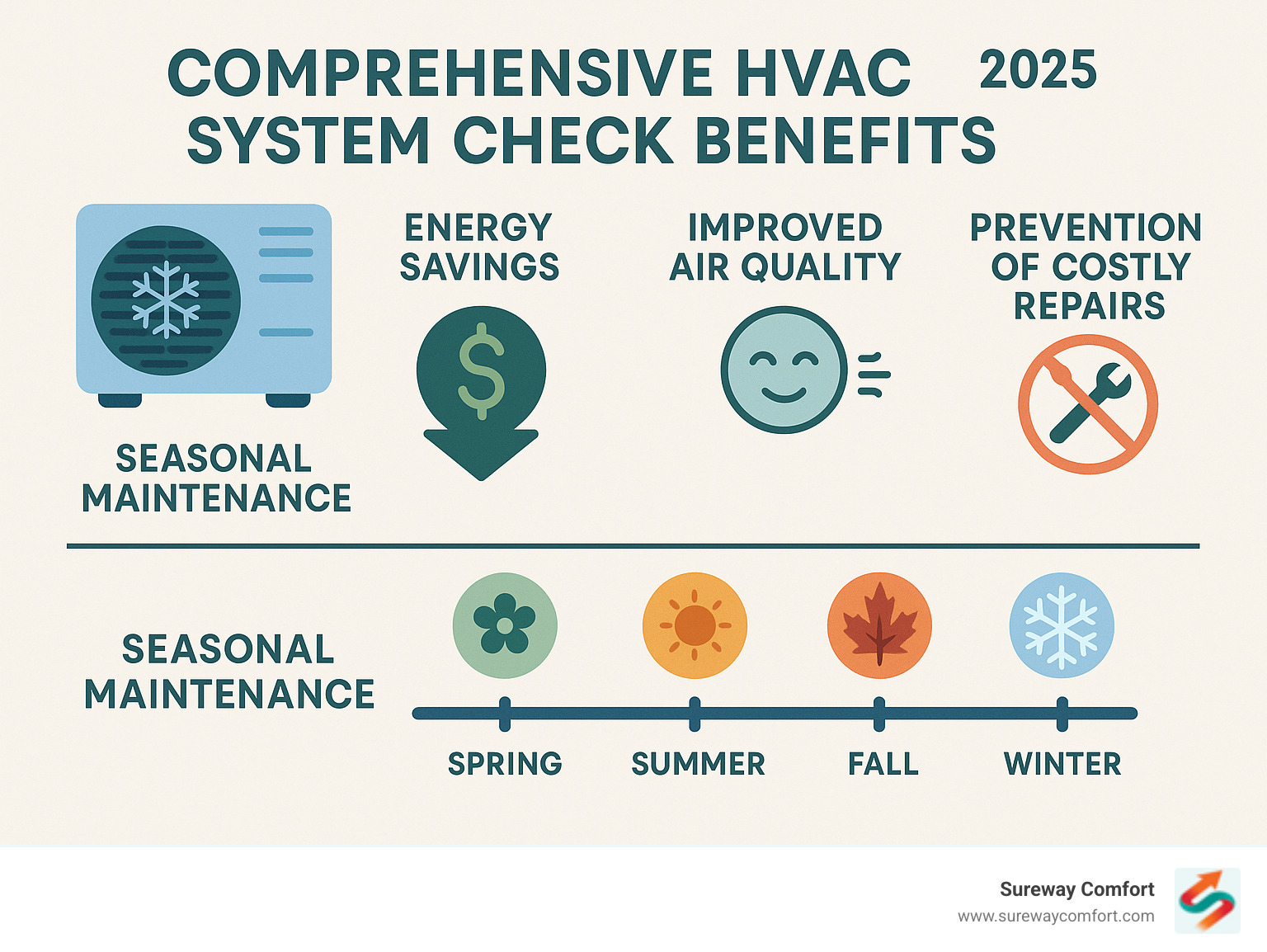
Explore more about hvac system check:
The Top 5 Benefits of Regular HVAC Maintenance
Regular HVAC maintenance is one of the smartest investments for your home's comfort, safety, and finances. An hvac system check is like a doctor's visit for your heating and cooling system, catching issues early to prevent emergency breakdowns. Here are the top benefits:
Lower energy bills are an immediate advantage. A clean, smooth-running system uses less energy to keep you comfortable. A professional tune-up can lead to a noticeable drop in utility costs.
Extended equipment lifespan saves you money in the long run. With proper care, your HVAC system can last 15-20 years. Regular check-ups catch minor problems before they cause major component failures.
Improved air quality is a key health benefit. Your system filters the air you breathe, and regular maintenance ensures it effectively removes dust, allergens, and other pollutants. This is especially important for families with allergies or respiratory issues.
Safety is critical, especially with gas furnaces. Professional maintenance includes thorough safety inspections of components like heat exchangers and gas connections to prevent hazardous situations like carbon monoxide leaks.
Preventing costly emergency repairs saves you stress and money. Regular maintenance identifies warning signs before they lead to complete system failures during extreme weather.
These professional checks are far more detailed than a general home inspection, focusing on specific components that can cause future problems.
The bottom line? A regular hvac system check turns your system into a reliable partner for year-round comfort.
Your Comprehensive HVAC System Check: DIY vs. Professional
Maintaining your HVAC system is like caring for a car: some tasks are simple DIY jobs, while others require a professional. This partnership approach to your hvac system check ensures your system runs safely and efficiently. Your regular upkeep prevents common problems, while our professional tune-ups address technical issues and catch problems you can't see.
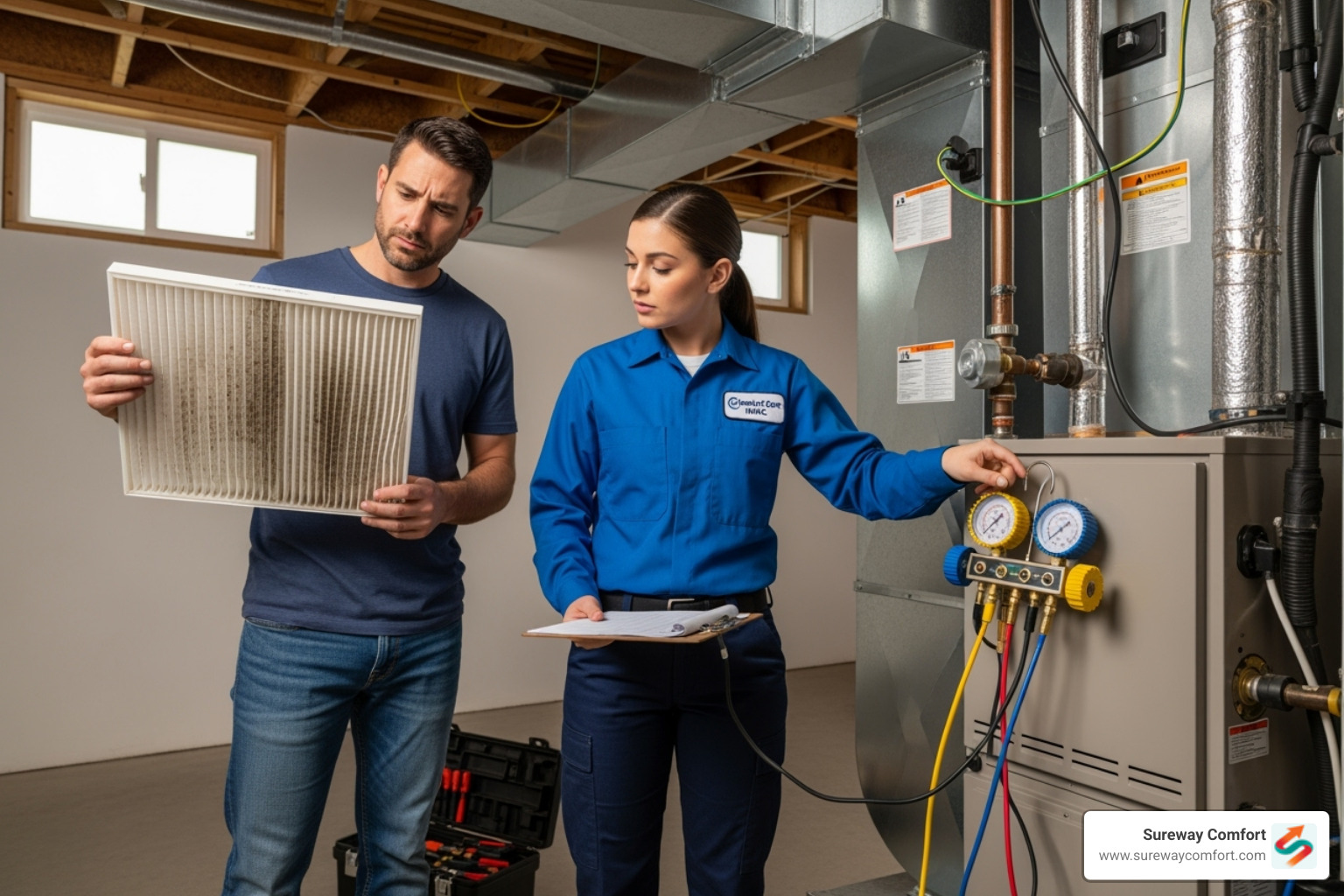
Your DIY HVAC system check checklist
These simple, regular tasks can prevent most common issues and save you money.
Check your thermostat: Ensure it's on the correct setting (heat/cool) and the fan is on "AUTO" to prevent unnecessary wear. Test it by adjusting the temperature to ensure the system responds.

Replace the air filter: This is the most important DIY task. A dirty filter reduces air quality, increases energy costs, and can damage the system. Check it monthly and replace it every 1-3 months, or more often in homes with pets or allergies.
Clean registers and vents: Vacuum registers and ensure they aren't blocked by furniture or rugs to maintain proper airflow.
Clear the outdoor unit: Remove leaves, grass, and debris from around the condenser. Maintain at least two feet of clearance on all sides for proper function.
Monitor the condensate drain line: Check for clogs to prevent water damage. Pouring vinegar down the line every few months can prevent buildup.
Check the outdoor unit's level: An unlevel unit can strain the compressor. Use shims to level it if needed, but call a professional for significant shifts.
What a professional HVAC system check includes
Our professional hvac system check addresses the technical components of your system using specialized tools and safety protocols.
Refrigerant check: We precisely measure refrigerant levels and check for leaks. Incorrect levels can damage the compressor and reduce efficiency.
Electrical inspection: We tighten all electrical connections and measure voltage to prevent fire hazards and component damage.
Lubricate moving parts: Proper lubrication of motors and other moving parts prevents premature wear and tear.
Coil cleaning: We use specialized cleaners for a deep cleaning of both indoor and outdoor coils, which is essential for efficient heat transfer.
Ductwork inspection: We inspect for hidden energy waste. According to ENERGY STAR, 20-30% of conditioned air can be lost through duct leaks. We locate and seal these leaks to improve efficiency.
Safety testing: This is our most critical service, especially for gas furnaces. We inspect heat exchangers for cracks, test gas pressure, and verify all safety controls are functioning correctly to protect your family.
When you combine your regular DIY maintenance with our professional expertise, you get a system that runs efficiently, safely, and reliably for years to come. Ready to schedule your professional tune-up? Contact us today to ensure your HVAC system is ready for whatever the season brings.
Seasonal Tune-Up: A Closer Look at Your AC and Furnace
Seasonal HVAC maintenance is all about timing. Preparing your systems before extreme weather is the smart move. We recommend scheduling your hvac system check in the spring for your air conditioner and in the fall for your furnace. This proactive approach helps catch small issues before they become expensive emergencies and ensures your system runs efficiently when you need it most.
Air Conditioner Inspection Checklist (Spring/Summer)
A spring hvac system check prepares your AC for reliable summer cooling.
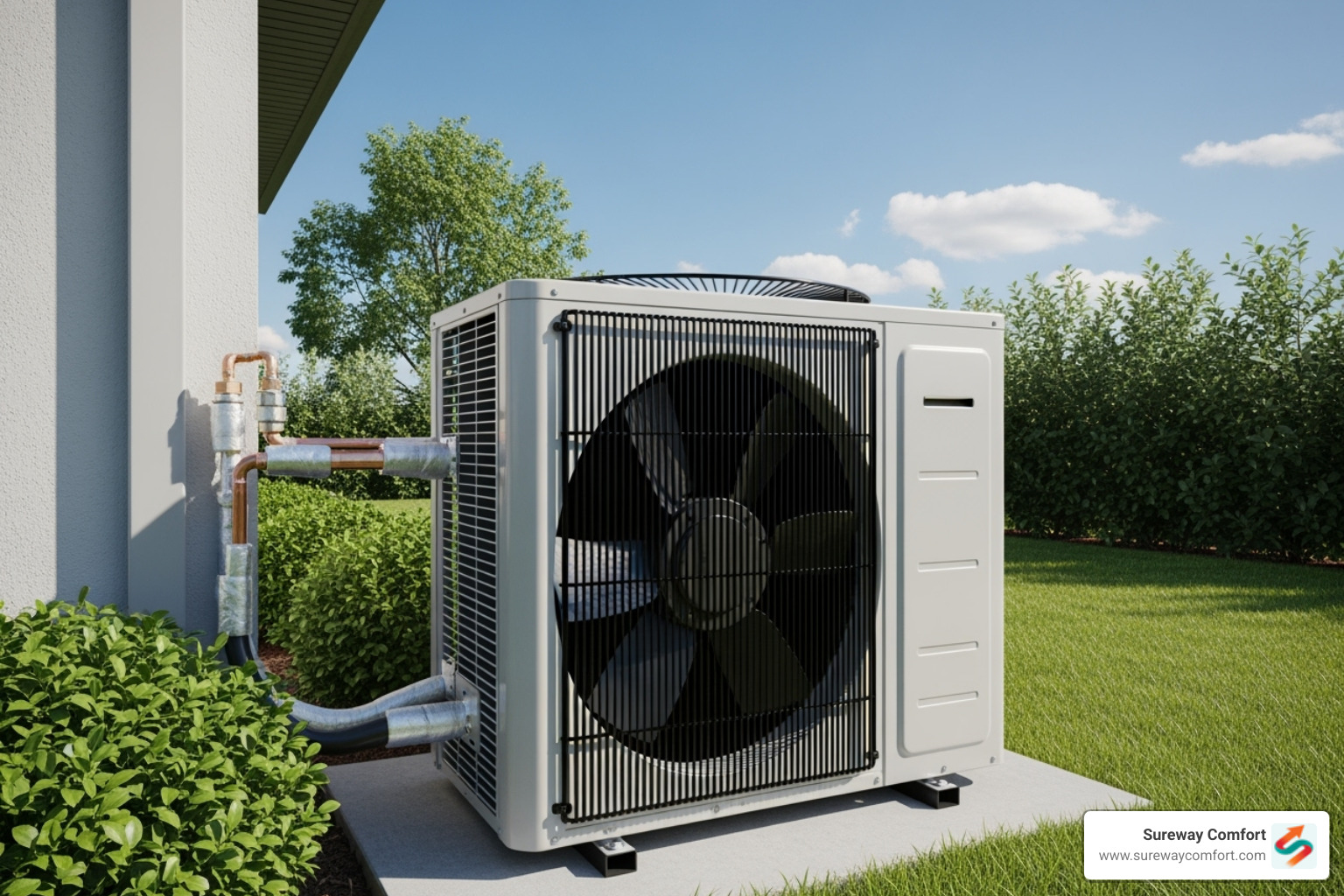
- Condenser coils: These outdoor coils release heat and need professional cleaning after collecting winter debris. Clogged coils reduce efficiency and increase energy bills.
- Evaporator coils: These indoor coils absorb heat. We inspect and clean them to ensure maximum cooling performance and good air quality.
- Refrigerant lines: We check for leaks and proper insulation. Low refrigerant almost always indicates a leak that needs repair.
- Condensate drain: We ensure the drain line is clear to prevent water damage and mold growth. Clearing a clogged condensate drain is a job for professionals.
- Blower motor and fan: We inspect, clean, and lubricate the blower motor and fan blades to ensure smooth, efficient airflow.
Furnace Inspection Checklist (Fall/Winter)
A fall hvac system check is crucial for both comfort and safety.
- Heat exchanger inspection: This is a critical safety check. A damaged heat exchanger can leak carbon monoxide, an odorless, colorless gas that poses serious health risks. We recommend installing CO detectors and knowing the warning signs of carbon monoxide poisoning.
- Burner and ignitor: We clean and adjust the burners for safe, efficient combustion and test the pilot light or electronic ignitor for reliable startup.
- Gas pressure check: We ensure the furnace receives the correct amount of fuel for safe and optimal performance.
- Blower assembly: We inspect, clean, and lubricate the blower to ensure effective heat distribution.
- Electrical components: We inspect all wiring and connections to prevent system failures and fire hazards.
These seasonal preparations help ensure your family stays comfortable and safe. If you're ready to schedule your seasonal tune-up, contact us to get your system ready for the months ahead.
Common Problems and Safety Hazards to Watch For
Even with good maintenance, your system may show warning signs. Knowing what to look for can help you prevent a small issue from becoming a major headache.
- Unusual noises: Your system should run quietly. Squealing often points to a belt or motor issue. Buzzing can indicate an electrical problem. Hissing may signal a refrigerant leak.
- Moisture or leaks: Water pooling around your indoor or outdoor unit is a red flag, often caused by a clogged condensate drain line. This can lead to water damage and mold.
- Foul odors: Musty smells suggest mold in the system or ductwork. A burning smell could be an electrical issue. A sulfur or rotten egg smell indicates a potential gas leak—evacuate immediately and call your gas provider.
- Temperature issues: If your system struggles to maintain the set temperature or heats/cools unevenly, it could be due to a dirty filter, duct leaks, or low refrigerant.
- High energy bills: A sudden spike in your utility bills often means your system has lost efficiency and is working harder than it should.
Some problems pose immediate safety risks and require a professional. A cracked heat exchanger can leak carbon monoxide. Frayed wiring or faulty electrical components are fire hazards. These issues are why professional checks are so important.
Warning signs that require immediate professional attention:
- Gas odors or suspected leaks
- Electrical burning smells
- Signs of carbon monoxide exposure
- Water leaks causing damage
- Complete system failure during extreme weather
- Any safety concerns you can't identify
When it comes to your family's safety, always err on the side of caution. If you notice these warning signs, don't wait. Our team at Sureway Comfort is here to help keep your system running safely.
Frequently Asked Questions about HVAC Inspections
Here are answers to the most common questions we receive about HVAC maintenance.
How often should I get an HVAC system check?
We recommend a biannual approach. Your system works hard all year, so it needs more than a single annual check.
- Spring: Schedule a tune-up for your air conditioning system before summer arrives.
- Fall: Have your furnace inspected to ensure it's safe and efficient for winter.This seasonal schedule aligns with most manufacturer recommendations and prepares each system for its peak season.
How much does a professional HVAC inspection cost?
Professional HVAC inspections typically range from $100 to $300. The price depends on the system type, number of units, and the depth of the evaluation. This investment often pays for itself by catching small issues before they become expensive emergency repairs. At Sureway Comfort, we provide transparent, upfront pricing with no hidden fees.
What's the most important DIY maintenance task I can do?
Change your air filter regularly. It's the single most effective thing you can do. A dirty filter is a leading cause of system failure, forcing your unit to work harder, increasing energy bills, and reducing indoor air quality. Check the filter monthly and replace it every 1-3 months, or more frequently if you have pets or allergies. It's an inexpensive task that takes minutes and protects your entire system.
Ready to schedule your professional hvac system check? Contact us at Sureway Comfort - we're here to help keep your home comfortable year-round.
Ensure Your Comfort Year-Round
Your HVAC system works hard to keep you comfortable, and it needs regular attention to thrive. A routine hvac system check is your key to lower energy bills, cleaner air, and peace of mind.
Proactive maintenance turns potential disasters into minor adjustments. Catching a strange noise early can mean a simple belt replacement instead of a full motor rebuild. We've seen too many homeowners in Bridgeville, South Fayette, Upper St. Clair, Mt. Lebanon, McDonald, Scott Township, Canonsburg, and Bethel Park face costly emergency repairs that could have been prevented.
Don't wait for your HVAC system to break down. Whether you need immediate repairs or want to set up a maintenance plan, our experienced technicians provide reliable service to keep your home comfortable year-round.
Your comfort is our priority.
Contact Sureway Comfort to schedule your next HVAC system check today!
For immediate AC repair needs, you can also schedule your AC repair in Mt. Lebanon, PA directly.



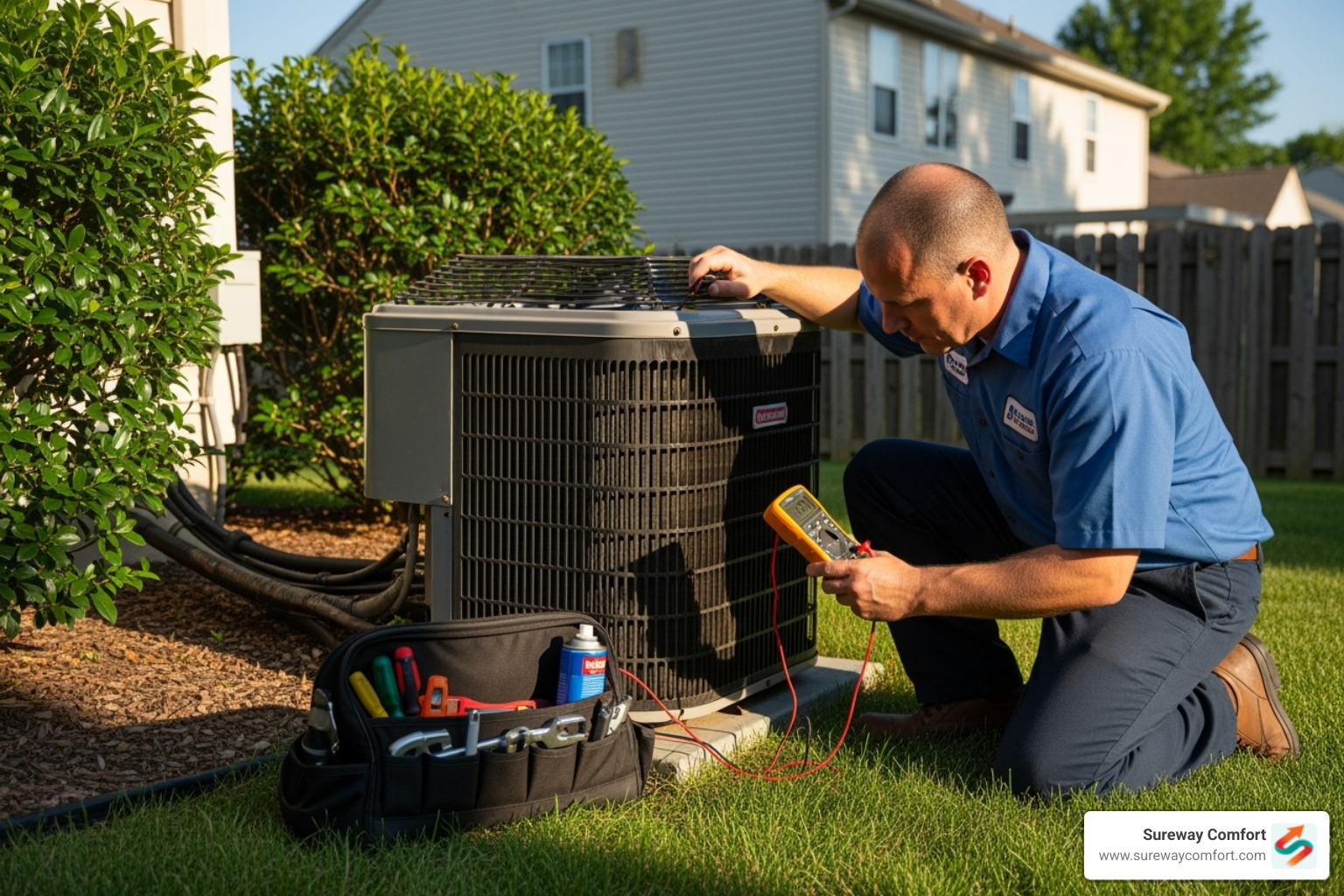
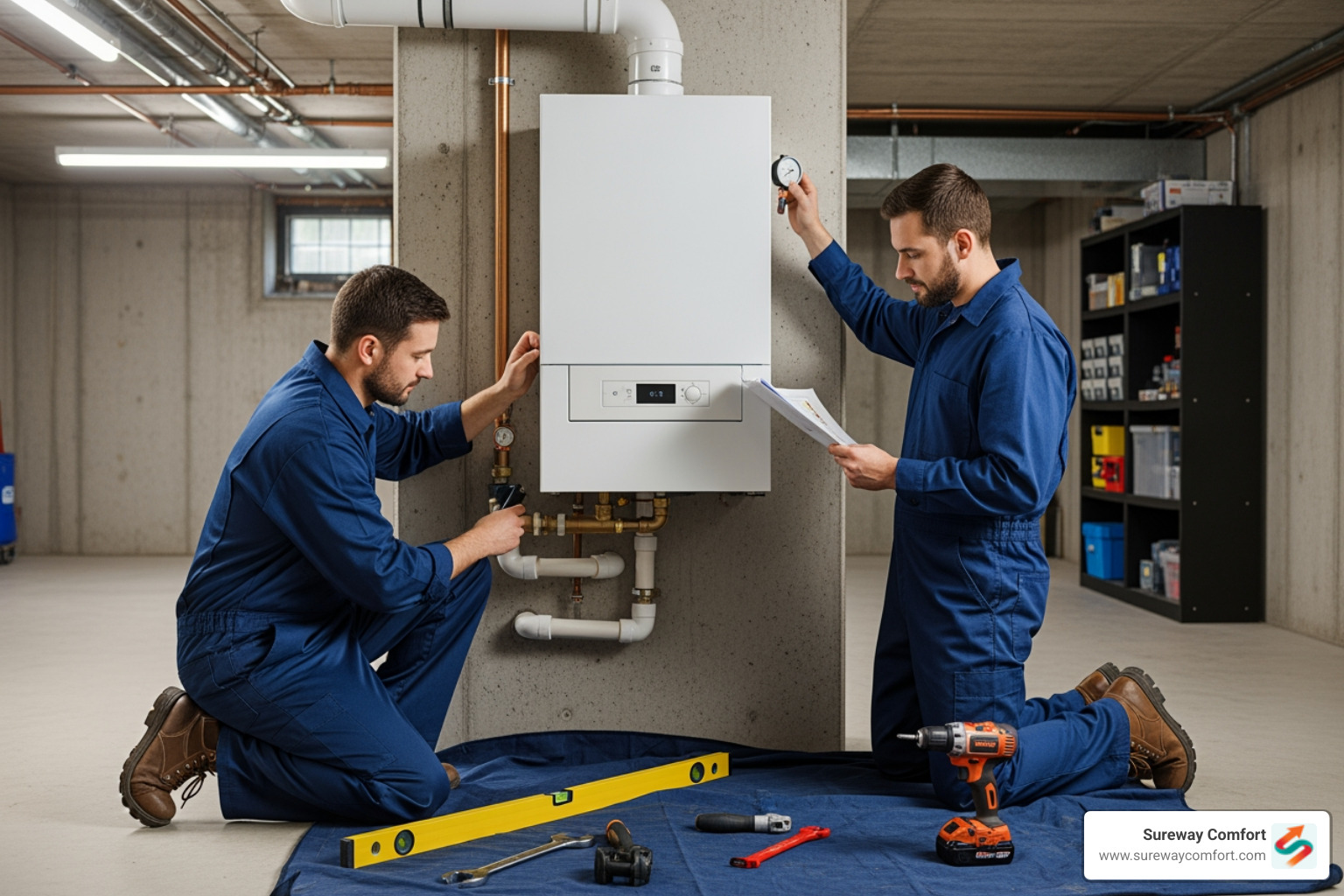

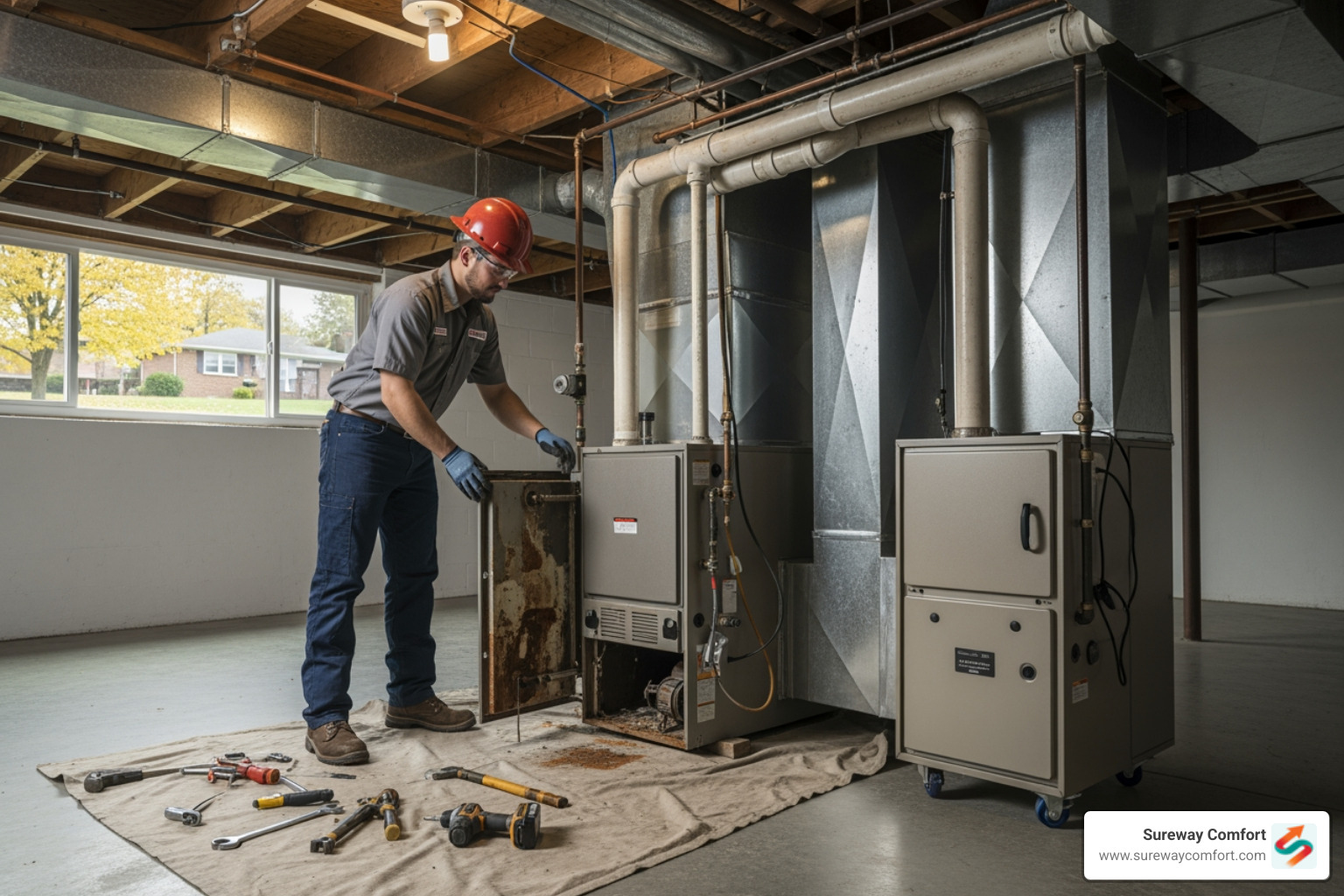
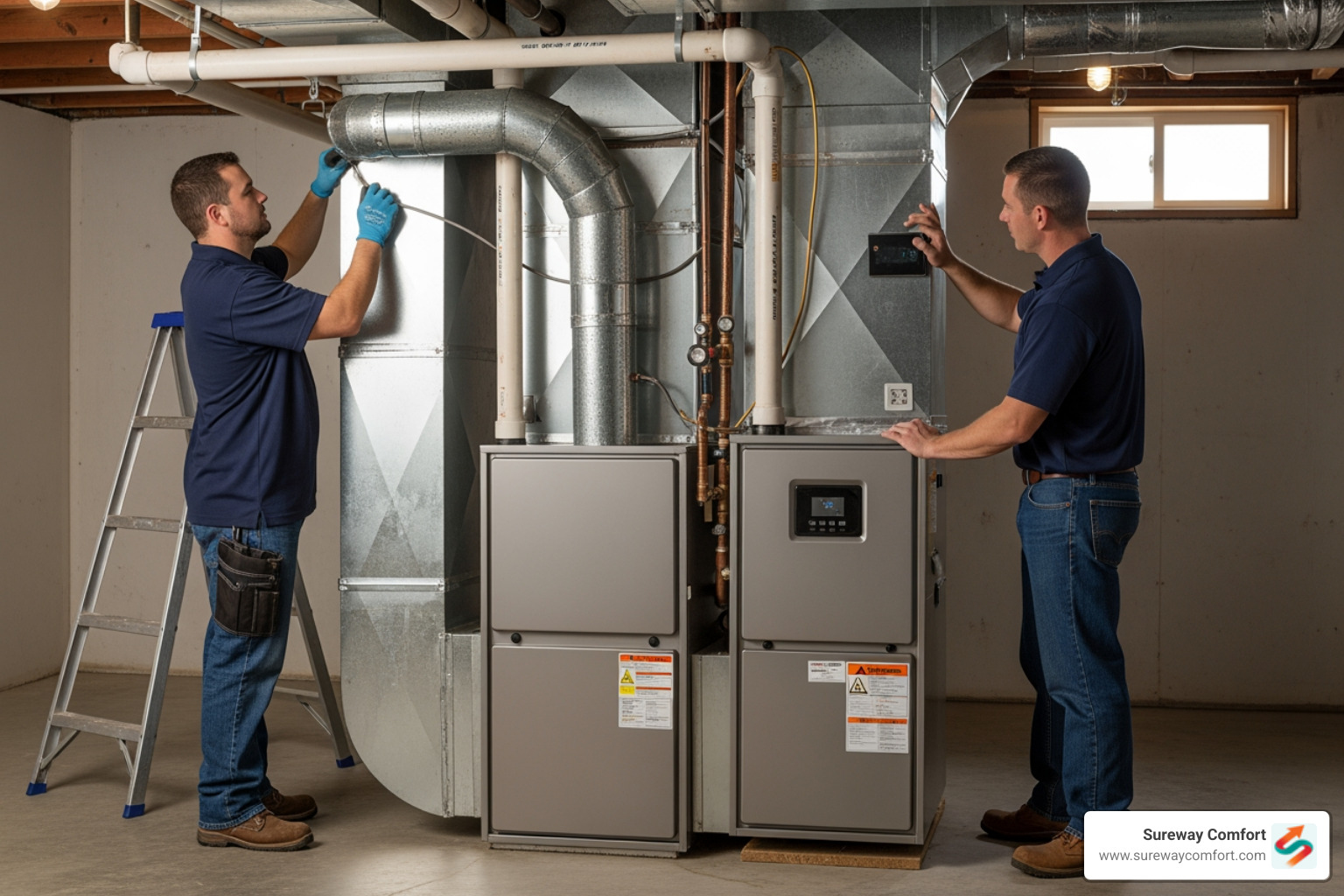




















.avif)



